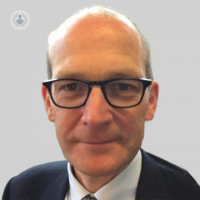The new Vantage frame by Elekta: Increased precision and patient comfort during Gamma Knife radiosurgery treatments
Written by:The Vantage frame by Elekta is a new patient head frame used exclusively at the specialised Queen Square (Gamma Knife) Radiosurgery Centre in London that allows for superior imaging and treatment accuracy.
Here to provide an expert insight into the new Vantage frame is Mr Neil Kitchen, distinguished Consultant Neurosurgeon and Medical Director at Queen Square (Gamma Knife) Radiosurgery Centre, London.

What is the new Vantage frame by Elekta?
The Vantage frame is a patient head frame used for Gamma Knife radiosurgery treatments. With a patient-friendly design, the new Vantage frame provides open-face visibility, improving patients’ comfort and increasing target visualisation for both diagnostic and treatment accuracy. The Vantage frame is also composed of only 10 parts and made of glass fibre reinforced epoxy instead of metal, which significantly reduces the potential for magnetic field induced heating.
Why was the new Vantage frame developed?
Gamma Knife radiosurgery is a highly specialised, non-invasive treatment that uses up to 192 focused beams of radiation to treat a range of tumours and lesions in the brain – all without harming healthy surrounding brain tissue. However, to maintain this level of precision, Gamma Knife requires patients to use an immobilisation frame during treatment, which is screwed and fitted to the head. While the screws don’t break the skin and a local anaesthetic is given, the fitting of the frame exerts pressure on the skull. As a result, some patients may experience a crushing sensation, leading to situational anxiety.
The journal ‘Advances in Radiation Oncology’ recently published a study that analysed the experience of anxiety in head and neck cancer patients who had undergone radiation therapy frame immobilisation. Although the research was not specific to Gamma Knife radiosurgery, 43 per cent of the patients experienced clinically significant anxiety before having their immobilisation frame fitted, and 30-43 per cent of the patients who experienced anxiety felt significant stress right before the start of their treatment. The study found that the immobilisation frame, which covers all of the face, also affected the clinicians’ duties, as it hindered their ability to respond to their patients’ anxiety and offer reassurance where needed.
What are the benefits of the new Vantage frame, for both patients and clinicians?
The new Vantage frame is lighter and less restrictive than traditional frames used in Gamma Knife treatments, which helps to ease the fitting process for both patients and clinicians. Patient feedback for the new frame is also positive, with many patients feeling more mobile, less anxious, and more open to the use of the frame. Additionally, with the Vantage frame, patients’ airways are left unobstructed and their facial expressions are clearly visible, which helps to improve patients’ experience.
Overall, the new Vantage frame effectively addresses historical patient feedback regarding the appearance, the limited adjustability, and the weight of traditional frames used in Gamma Knife treatments - all without compromising clinical outcomes. While some patients may still require the use of the traditional frame, patients who require Gamma Knife treatment for their condition can now request a clinical assessment to determine their suitability for the new Vantage frame.
Mr Neil Kitchen is a highly regarded Consultant Neurosurgeon, Medical Director at The Gamma Knife Centre part of the National Hospital of Neurology and Neurosurgery and UCLH, and lead neurosurgeon for skull-base surgery and neuro-oncology.
If you require Gamma Knife radiosurgery and you would like to consult your options with an expert, do not hesitate to book an appointment with Mr Kitchen via his Top Doctors profile today.


